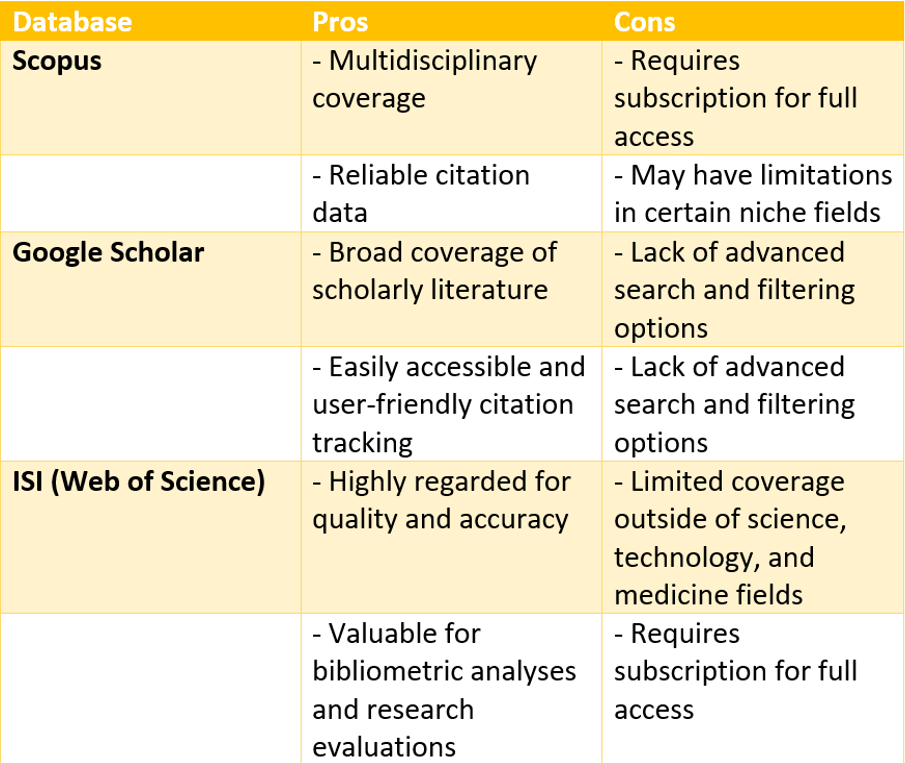Databases used for h-index calculation


You can calculate your h-index utilizing three notable databases including
Google Scholar, a freely accessible search engine, has gained popularity among researchers for its broad coverage of scholarly literature. It indexes multiple sources, including journal articles, conference papers, theses, and dissertations. Scholars can see how many citations their articles received through Google Scholar's citation tracking service. While Google Scholar's citation data may not be as comprehensive or accurate as that of Scopus or ISI, it is a valuable tool for estimating citation counts and calculating the h-index, especially for researchers without having access to subscription-based databases.

One of the major databases of citations and abstracts is Scopus, which belongs to Elsevier. It offers comprehensive coverage of academic literature across a wide range of fields. Millions of records from different sources, such as publications, conference papers, and patents, are available on Scopus. It offers comprehensive citation data, enabling researchers to track the impact of their work and calculate their h-index. Scopus is widely used due to its multidisciplinary coverage and reliable citation data, making it a valuable resource for h-index calculations.

The Institute for Scientific Information (ISI) is known for its Web of Science database, which covers an extensive array of disciplines and provides access to high-quality scholarly literature. Web of Science includes journals, conference proceedings, and other scientific literature. It offers a reliable source for citation data and enables researchers to calculate their h-index accurately. In the academic world, ISI's indexing and citation statistics are highly valued and frequently utilized for bibliometric analysis and research evaluations.

All of these databases have pros and cons of their own. Scopus is recognized for its multidisciplinary coverage and reliable citation data, making it suitable for comprehensive h-index calculations. Although not as thorough, Google Scholar is practical for citation count estimation because it offers easily accessible and user-friendly citation tracking features. In particular, the science, technology, and medical domains hold the ISI's Web of Science database in the highest regard for its quality and accuracy.

It's important to note that h-index values may fluctuate between these databases due to variations in data sources, indexing methods, and coverage. Researchers ought to utilize multiple databases to have a more thorough picture of their study impact and to cross-validate their h-index.
In conclusion, Scopus, Google Scholar, and ISI (Web of Science) are widely used databases for calculating the h-index. Each database has strengths and limitations, offering researchers different options to assess their research impact. Researchers should choose the most suitable database(s) based on their disciplinary focus, access availability, and the specific requirements of their field. Researchers can assess their scholarly impact and make valuable contributions to the field's body of knowledge through these databases.
Are you a researcher aspiring to publish your journal article in esteemed ISI or Scopus indexed journals?
Look no further than SITA Publication Assistance!
SITA Academy
Our experienced team specializes in helping researchers navigate the complex publication process and increase their chances of acceptance in renowned ISI and Scopus journals. From manuscript editing and formatting to targeted journal selection and submission guidance, we provide comprehensive support tailored to your specific research needs. Trust SITA to elevate the visibility and impact of your work. Contact us today to explore how we can assist you in achieving your publication goals in ISI and Scopus-indexed journals.
If you have any questions, inquiries, or would like to learn more about our services, please don't hesitate to reach out to us. Our dedicated team is ready to assist you.